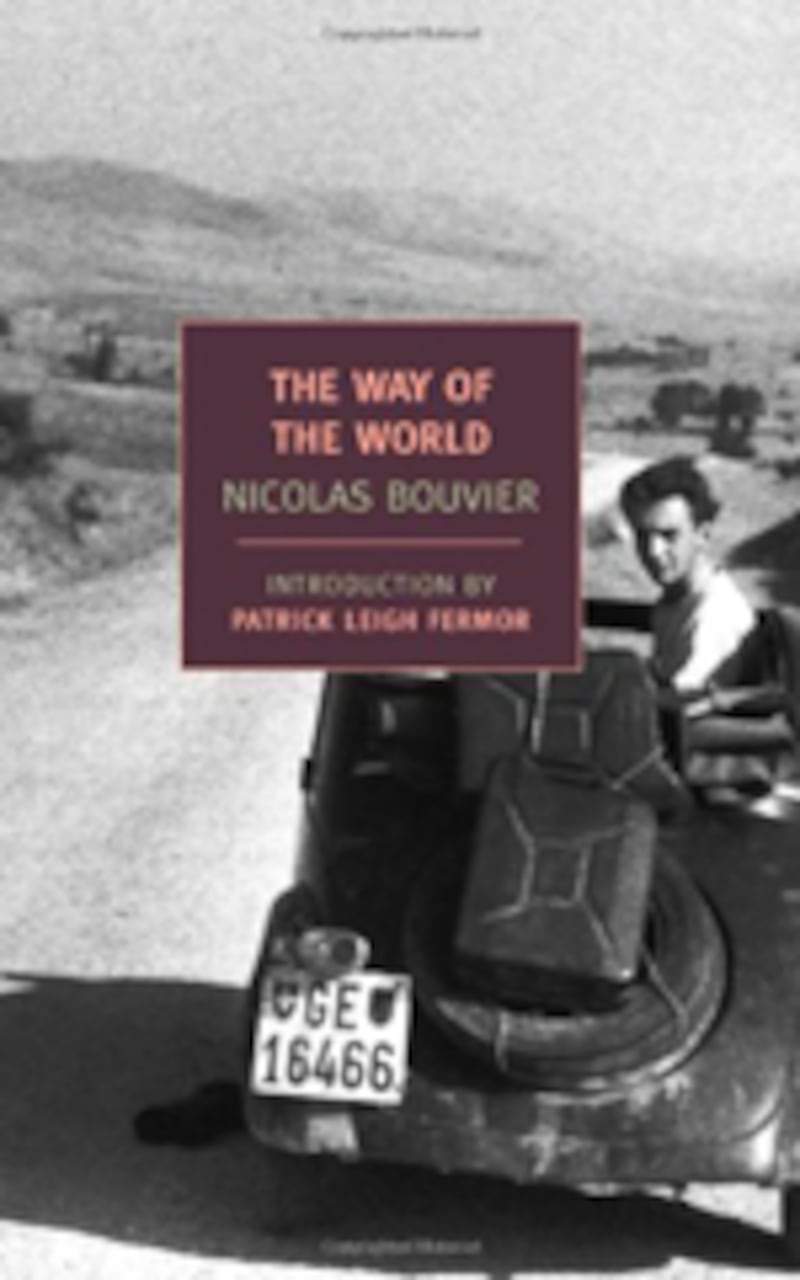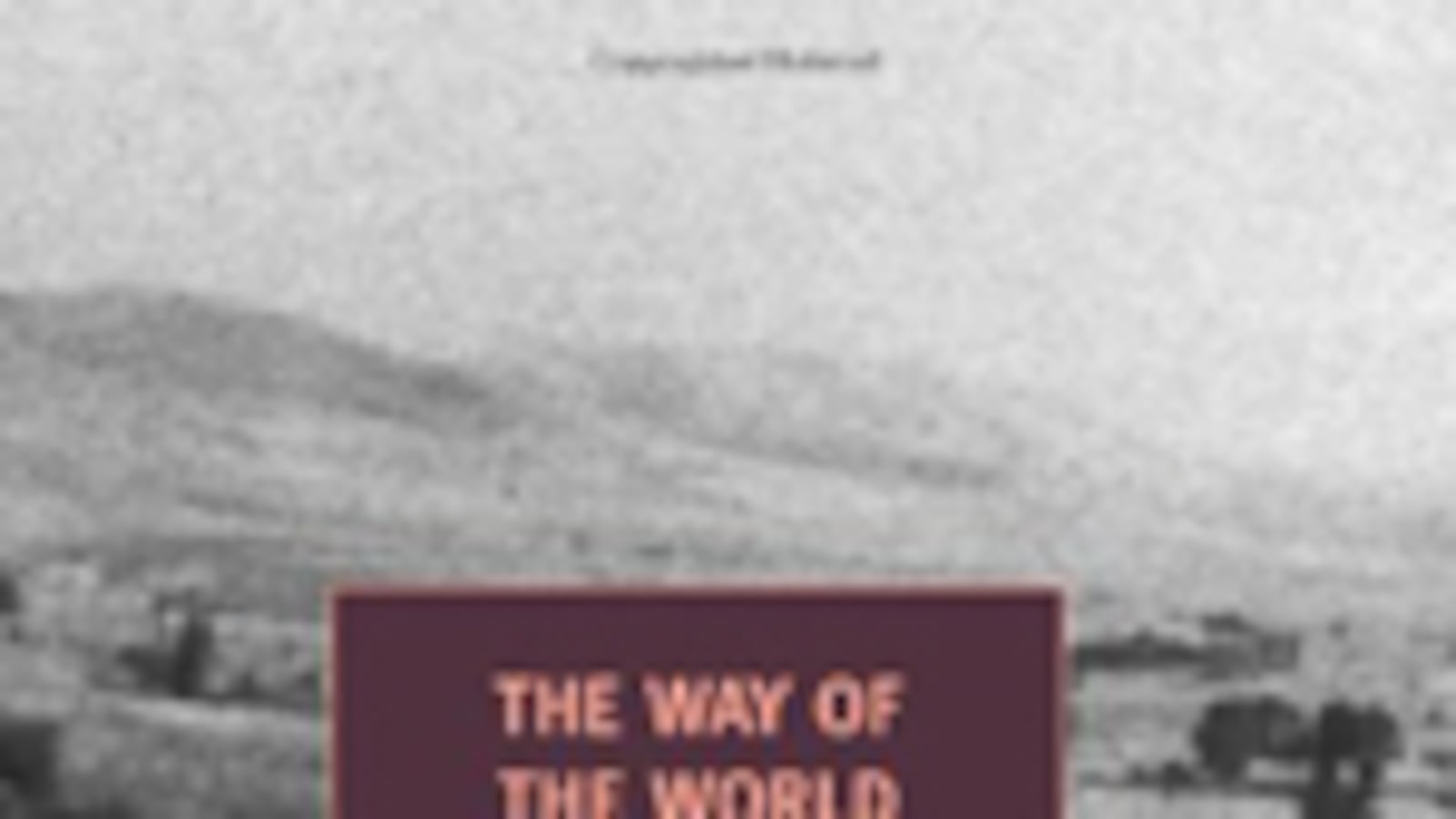
The Way of the WorldBy Nicolas Bouvier
It was a Parisian Indiana Jones, eccentrically dressed in a khaki combat jacket and French beret, who first told me about The Way of the World. We were in Northeast Afghanistan, camping on top of a hill overlooking a large archaeological site that may or may not have been the city where Alexander the Great met his bride Roxane. I was just out of college and had, at that moment, decided to become an archaeologist. I was in such awe of the man that he could have told me to read the phonebook and I would have. It was a fortunate thing he didn't, and instead recommended one of the forgotten marvels of 20th-century travel literature.
The Way of the World, elegantly reissued by New York Review of Books Classics, is a young man's book, in the sense that it is the story of a young man, Nicolas Bouvier, and a journey he makes from his hometown of Geneva overland to Pakistan. However, unlike many young men's books, it is not a book of tempestuous emotions, reckless action, bolt-from-the-blue self-discovery. Rather, it unfurls its delights slowly—even modestly—drawing the reader into its world and enveloping him in a haze of shimmering images and impressionistic brushstrokes punctured by razor-sharp insights, self-aware humor, and pinpoint character sketches.
Leaving in June 1953, Bouvier and a friend traveled in a battered old Fiat Topolino through Yugoslavia, Turkey, Iran, Afghanistan, and over the Khyber Pass into Pakistan. Like the hippies that were to follow a similar route in the '60s and '70s, they had very little money and a lot of time, denying themselves "every luxury except one, that of being slow." Rejecting the heroic travel narratives of earlier generations, Bouvier injects a new slacker philosophy into foreign travel, a philosophy where "loafing around in a new world is the most absorbing occupation." At times, the journey grinds to a complete halt as they while away months in Polish pensions in Istanbul, lodgings in suburban Belgrade full of impoverished artists, and even a Persian prison, where their status as guests or prisoners is never made completely clear. During these periods, Bouvier describes the rich cast of eccentrics he meets in joyful, minute detail. While quite capable of mixing it with the Tehrani glitterati, he is more instinctively drawn to the marginalized, the esoteric, the forgotten: Serbian prostitutes, gypsies (whose photo-taking sessions end in "a whirl of gaiety and blood"), wandering Zoroastrians, itinerant accordion players.
Lost names, forsaken beliefs…Bouvier is fascinated too by the Westerners washed up in these out-of-the-way lands. In Tabriz, he meets a lone French priest whose congregation has deserted him and who now whiles away his days smoking and reading detective novels; in Quetta, he falls in with an old Guards officer, Terence, who, like some lost lotus-eater, continues to read Proust and talk about colonial days as if Independence had never happened, while Pathans who he would once have fought against sip their drinks next to him at the bar.
—Thomas B. Wide, Contributor

Sunset Park By Paul Auster
Paul Auster is one of those sages with confounding talent—confounding for one because he's simply that good, and confounding for two, because, despite a prolific output of novels, nonfiction, and poetry over a long, illustrious career, he's not more widely read. Sunset Park, his newest clover, might be "the novel that brings him a broader readership," promises one early review. Which is not to say that Auster doesn't have a serious fan-ship—he certainly does—but sales-wise, he belongs among Vonnegut, Roth, and DeLillo.
If, for a while, critical attention was heaped on post-9/11 fiction—What is it? Who did it best? Or, more typically, worst?—now is the time to herald the Post-Recession Novel. Sunset Park looks to be it. New York City, where the book takes place, is often not the right venue to dip into broader American sentiment—it's a different beast from Dubuque or Lubbock or anywhere else in the country. But in Auster's characters, which include a publisher, some rent-fugitive Brooklynites, and a Broadway actress, there are the entrails of the everyman. Take, for example, this snippet of micro/macro, in standard Auster style:
"Bing left an hour ago to rehearse with his band, Ellen is spending the day with her sister and the little twins on the Upper West Side, and Jake is in Montclair, New Jersey, visiting his brother and sister-in-law, who have just had a child as well. Babies are popping out all over, in every part of the globe women are huffing and heaving and disgorging fresh battalions of newborns, doing their bit to prolong the human race…"
The proper names are those of the squatters, holed up illegally in the Sunset Park neighborhood of Brooklyn, the Netherlands of yuppie domesticity (near Auster's actual Park Slope residence). They barely scrape by, as everyone else in the world is struggling to do, as life goes on. One of them realizes she is paid less as a part-time employee of PEN than she would be as a burger-flipper or a car-wash girl. That's not an indictment of the organization, which Auster is the real-life vice president of, but a comment on the sorry shape of the publishing industry.
"So much, he says, for the best days of our lives," as another line goes. The other characters struggle, too, to varying material degrees, but all existentially. That is Auster's great faculty—the essence of the present. One is inclined to quote the last lines of the book, among the best, most beautiful last ever written, right up there with boats borne ceaselessly back, but that would spoil a thing that everyone should read.
—Claire Howorth, Arts Editor

The Box By Gunter Grass
In 2006 Günter Grass revealed that he spent the final year of World War II as a terrified conscript in a Waffen-SS uniform, and the international literary community exploded in disgust that a man who had built his name as a moral authority once wore that uniform. To deflect this outrage, Grass produced Peeling the Onion, a memoir as lovely as any of his novels, which explained his youthful stupidity without trying to explain it away.
That book stops in 1959, just before The Tin Drum transformed the ashamed ex-soldier into an international literary star, and that is roughly where The Box picks up the story. But rather than painstakingly detail the many achievements of a man about whom all the facts are known—including, now, that nasty little one— The Box is a slim chronicle of a public figure's private life. Freed from the defensive crouch of his straightforward memoir, Grass has produced something more obscure and occasionally just as beautiful.
Although a sort of sequel to Peeling the Onion, this is a piece of fiction rooted in the truth. At his 80th birthday, an old writer gathers his eight children around a tape recorder and demands they share their memories. Aside from short, fairy-tale like introductions, the whole of the novel is given over to their conversations, which rarely touch on the ever-busy father. Instead they focus on Marie, a kind of nanny who documents their lives with a special box camera, whose prints show the past, future, and a world where the children's wishes are real. In her darkroom, bombed out buildings return to their Weimar splendor, a parking lot becomes a medieval inn, and the children are transformed into cavemen, gnawing on bones that the father suspects are his. The pictures inspire his writing—over and over, his novels famous motifs are credited to the creative camera—while the children use them as temporary escapes from their "godawful mess" of a family.
Their conversations are presented like a play with no character names, and it is a neverending puzzle to establish who is speaking at any given moment. Their voices are indistinguishable, and the stiff translation doesn't help. But what is at first maddening becomes fun, and after a few chapters, structure appears. We recognize the speakers by their preoccupations. Jorsch won't stop trying to establish the make and model of the magic camera; Taddel complains that the photographic miracles were impossible, and Lara can't forget her long dead dog Joggi, whose arrival was prophesied by one of Marie's prints.
As they harp about the wishes that came true in the darkoom, we get a negative image of the father who was unable to fulfill them himself. He floats silently in the background, smirking at his children while he relights his pipe. As a record of his life it offers none of the easy pleasure of Peeling the Onion, but those who have stayed true to Grass since 2006 shouldn't have any trouble following it to the end.
—W.M. Akers






